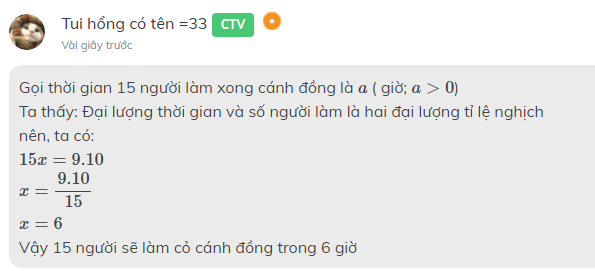đặt 20 câu ghép từ 2 câu đơn
Hãy nhập câu hỏi của bạn vào đây, nếu là tài khoản VIP, bạn sẽ được ưu tiên trả lời.


Số tiền lãi là:
50250000-50000000=250000(đồng)
Phần trăm tiền lãi là
\(\dfrac{250000}{50000000}=0,5\%\)

a: \(A\left(x\right)=x^3+3x^2-5x-2x^2+5x^3+x^4-2x+1\)
\(=x^4+\left(x^3+5x^3\right)+\left(3x^2-2x^2\right)+\left(-5x-2x\right)+1\)
\(=x^4+6x^3+x^2-7x+1\)
Bậc là 4
Hệ số cao nhất là 1
Hệ số tự do là 1
b: \(B\left(x\right)=-x^6+2x^3+6-2x^4+x^6-x-5+2x^4+x^3\)
\(=\left(-x^6+x^6\right)+\left(-2x^4+2x^4\right)+\left(2x^3+x^3\right)+\left(-x\right)+\left(6-5\right)\)
\(=3x^3-x+1\)
Bậc là 3
Hệ số cao nhất là 3
Hệ số tự do là 1

Khối 2 có 130+50=180(bạn)
Khối 3 có 130x2=260(bạn)
Cả ba khối có 130+180+260=570(bạn)
Khối 2 có tất cả số học sinh là:
\(130+50=180\) ( học sinh)
Khối 3 có tất cả số học sinh là:
\(130\times2=260\) ( học sinh)
Cả 3 khối có tất cả số học sinh là:
\(130+180+260=570\) ( học sinh)

\(\left(\dfrac{-5}{8}+\dfrac{6}{17}\right).\dfrac{3}{2}+\left(\dfrac{-3}{8}+\dfrac{11}{17}\right).\dfrac{3}{2}\)
\(=\left(\dfrac{-5}{8}+\dfrac{6}{17}+\dfrac{-3}{8}+\dfrac{11}{17}\right).\dfrac{3}{2}\)
\(=\left[\left(\dfrac{-5}{8}-\dfrac{3}{8}\right)+\left(\dfrac{6}{17}+\dfrac{11}{17}\right)\right].\dfrac{3}{2}\)
\(=\left[\dfrac{-8}{8}+\dfrac{17}{17}\right].\dfrac{3}{2}\)
\(=\left[-1+1\right].\dfrac{3}{2}\)
\(=0.\dfrac{3}{2}=0\)

Gọi thời gian 15 người làm xong cánh đồng là \(a\) ( giờ; \(a>0\))
Ta thấy: Đại lượng thời gian và số người làm là hai đại lượng tỉ lệ nghịch
nên, ta có:
\(15x=9.10\)
\(x=\dfrac{9.10}{15}\)
\(x=6\)
Vậy 15 người sẽ làm cỏ cánh đồng trong 6 giờ

\(x:11+412=902\cdot11\\ x:11+412=9922\\ x:11=9922-412=9510\\ x=9510\cdot11=104610\)

There is (be) always a lot of traffic, day and night.
My friend, Michelle, and I spent (spend) five days in Hoi An last year.
We usually stay (stay) at home for a holiday, but this holiday we are traveling (travel) abroad.
Are (be) there any bookstores in your neighborhood?
My grandma doesn't like (not like) living in the city.
How do I get (I/ get) to the railway station? - Go straight ahead then turn left.
Where are you going (you/ go) now? - We are going (go) to Tan Ky House.
My grandmother often gets (get) up at 6:00 and goes (go) jogging.
He doesn't go (not go) to the movie on Sunday evenings.
I live (live) in Ha Noi with my parents now. (While "am living" is also possible, "live" is more common for a present state.)
He must do (do) the housework everyday. (Modal verbs like "must" are followed by the base form of the verb.)
His mother should tell (tell) him the truth. (Modal verbs like "should" are followed by the base form of the verb.)
What is Mai doing (do) now? - She is playing (play) in the garden.
Tim reads (read) and listens (listen) to English each day.
What does your father do (do)? - He is (be) a teacher.
Minh plays (play) soccer every Sunday.
What time do you go (go) to bed?
Is (be) there a post office nearby? - No. There are (be) no post offices near here.
My father reads (read) the newspaper every morning.
Jane always has (have) breakfast at 6 o’clock.
1. is
2. spent
3. stay - are traveling
4. Are
5. doesn't like
6. do I get
7. are you going - are going
8. gets
9. doesn't go
10. am living
11. do
12. tell
13. doing - is playing
14. reads - listens
15. do - is
16. plays
17. do - go
18. Is - are
19. reads
20. has
